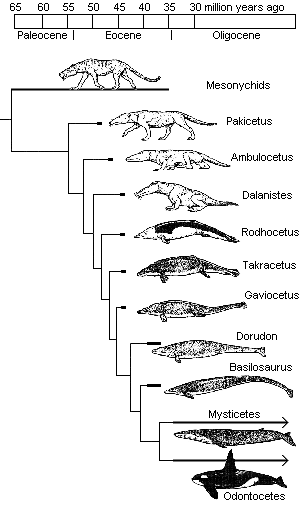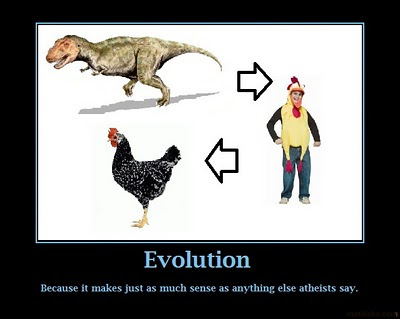Whale Evolution:
Call it an unfinished story, but with a plot that's a grabber. It's the tale of an ancient land mammal making its way back to the sea, becoming the forerunner of today's whales. In doing so, it lost its legs, and all of its vital systems became adapted to a marine existence -- the reverse of what happened millions of years previously, when the first animals crawled out of the sea onto land.
Some details remain fuzzy and under investigation. But we know for certain that this back-to-the-water evolution did occur, thanks to a profusion of intermediate fossils that have been uncovered over the past two decades.
In 1978, paleontologist Phil Gingerich discovered a 52-million-year-old skull in Pakistan that resembled fossils of creodonts -- wolf-sized carnivores that lived between 60 and 37 million years ago, in the early Eocene epoch. But the skull also had characteristics in common with the Archaeocetes, the oldest known whales. The new bones, dubbed Pakicetus, proved to have key features that were transitional between terrestrial mammals and the earliest true whales. One of the most interesting was the ear region of the skull. In whales, it is extensively modified for directional hearing underwater. In Pakicetus, the ear region is intermediate between that of terrestrial and fully aquatic animals.
Another, slightly more recent form, called Ambulocetus, was an amphibious animal. Its forelimbs were equipped with fingers and small hooves. The hind feet of Ambulocetus, however, were clearly adapted for swimming. Functional analysis of its skeleton shows that it could get around effectively on land and could swim by pushing back with its hind feet and undulating its tail, as otters do today.
Rhodocetus shows evidence of an increasingly marine lifestyle. Its neck vertebrae are shorter, giving it a less flexible, more stable neck -- an adaptation for swimming also seen in other aquatic animals such as sea cows, and in an extreme form in modern whales. The ear region of its skull is more specialized for underwater hearing. And its legs are disengaged from its pelvis, symbolizing the severance of the connection to land locomotion.
By 40 million years ago, Basilosaurus -- clearly an animal fully adapted to an aquatic environment -- was swimming the ancient seas, propelled by its sturdy flippers and long, flexible body. Yet Basilosaurus still retained small, weak hind legs -- baggage from its evolutionary past -- even though it could not walk on land.
None of these animals is necessarily a direct ancestor of the whales we know today; they may be side branches of the family tree. But the important thing is that each fossil whale shares new, whale-like features with the whales we know today, and in the fossil record, we can observe the gradual accumulation of these aquatic adaptations in the lineage that led to modern whales.
As evolutionary biologist Neil Shubin points out, "In one sense, evolution didn't invent anything new with whales. It was just tinkering with land mammals. It's using the old to make the new."





